Contemporary Global Issues in Management: Capitalism in Business
VerifiedAdded on 2022/10/04
|6
|1256
|24
Essay
AI Summary
This essay provides a comprehensive analysis of contemporary global issues in management, specifically focusing on capitalism. It begins by defining capitalism and exploring its key influences, including globalization, free-market ideas, and market competition. The essay then examines the concept of responsible enterprise as a crucial component of modern capitalism and discusses the likely future directions of capitalism, including the increasing trend towards globalization and homogenous economic systems. It delves into the social, environmental, and economic consequences of capitalism, highlighting issues such as social inequality, environmental pollution, and the cost of living. Furthermore, the essay addresses the realism of endless economic growth, suggesting that it is achievable through sustainable practices and eco-innovations. It also explores the role of the state in fostering economic activity and identifies key issues arising in relation to capitalism from an international business perspective, such as unbalanced power distribution and labor exploitation. The essay concludes with a discussion of the need to avoid ecological breaches through sustainable practices and the role of the state in creating the conditions for economic activity, offering a well-rounded perspective on the subject.
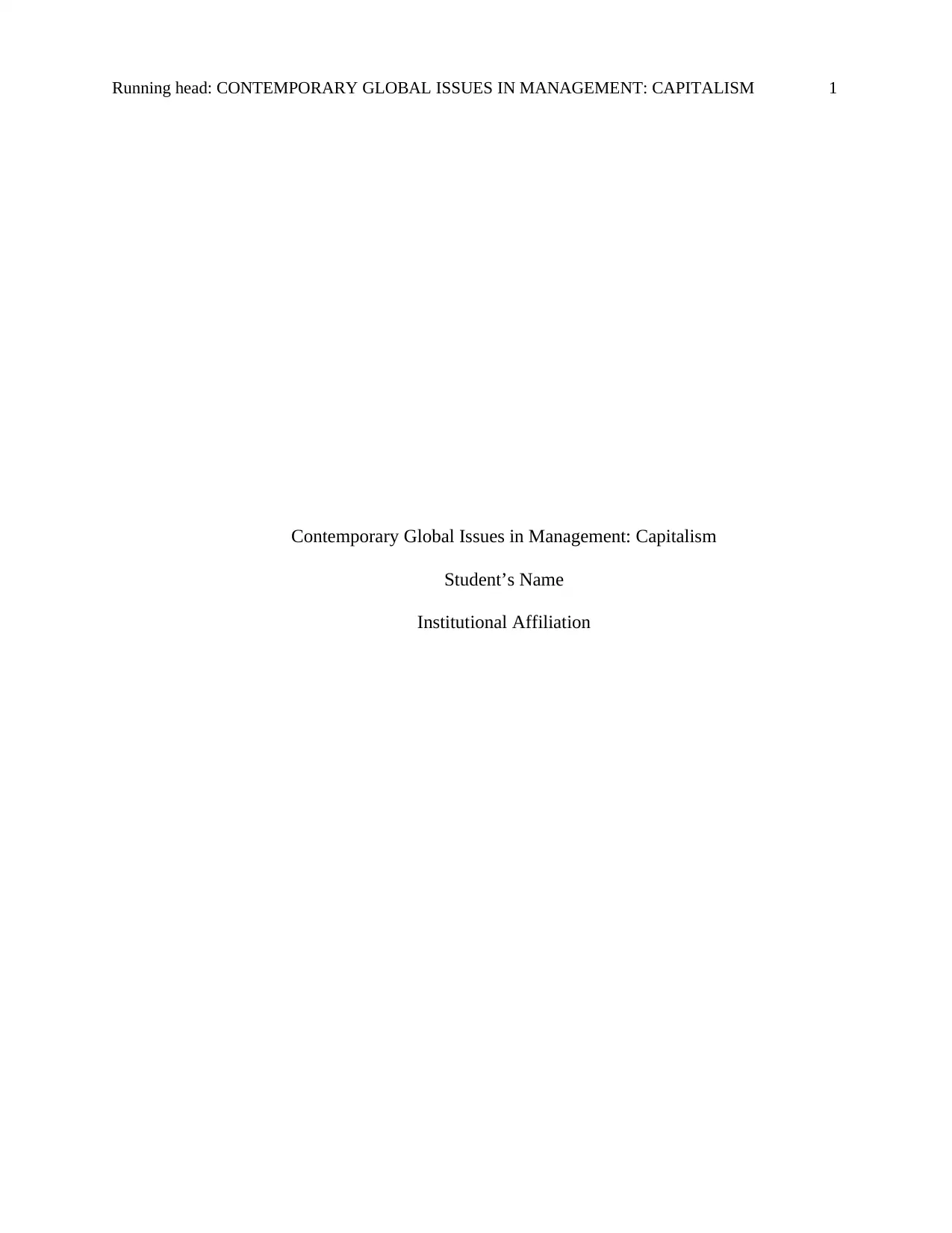
Running head: CONTEMPORARY GLOBAL ISSUES IN MANAGEMENT: CAPITALISM 1
Contemporary Global Issues in Management: Capitalism
Student’s Name
Institutional Affiliation
Contemporary Global Issues in Management: Capitalism
Student’s Name
Institutional Affiliation
Paraphrase This Document
Need a fresh take? Get an instant paraphrase of this document with our AI Paraphraser
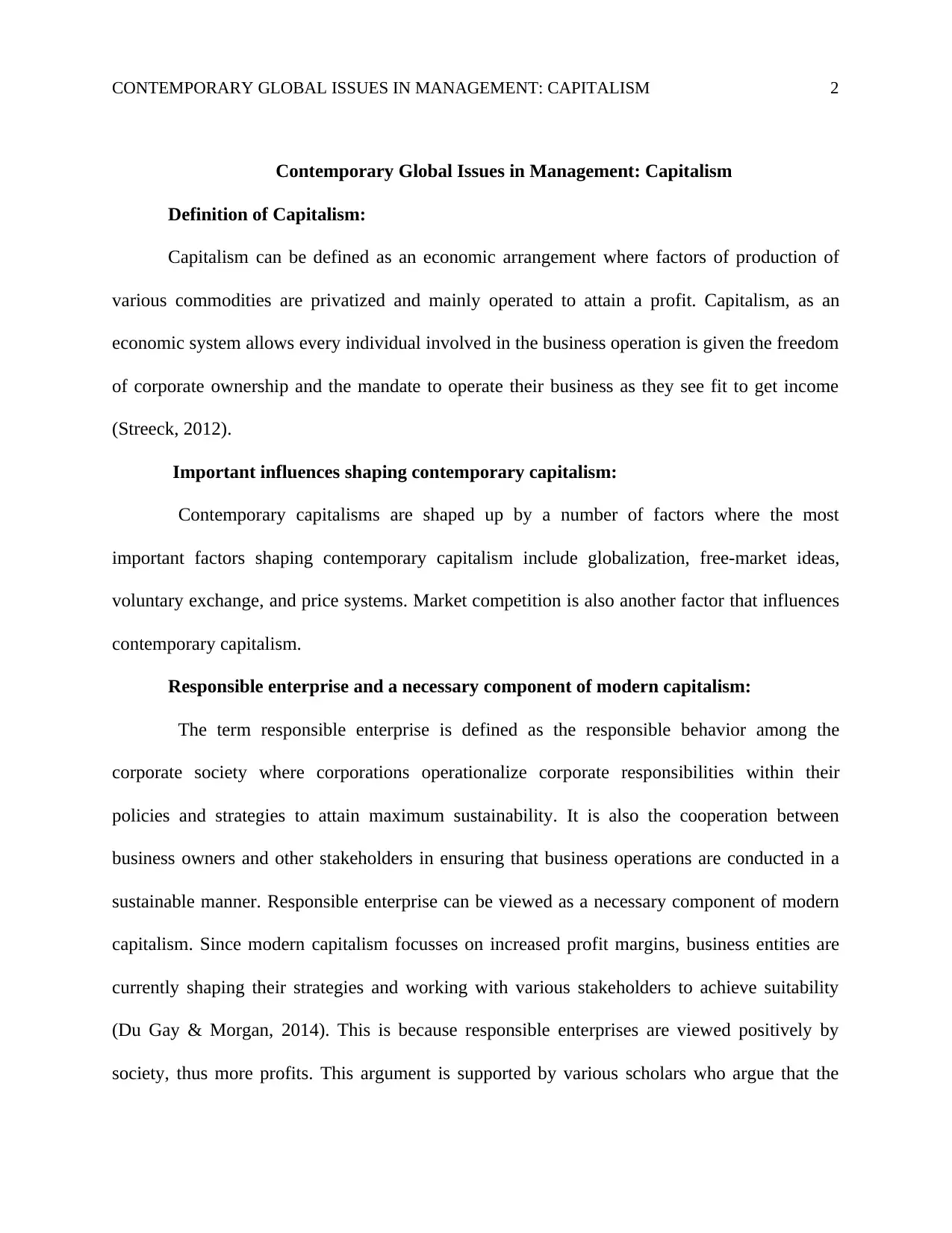
CONTEMPORARY GLOBAL ISSUES IN MANAGEMENT: CAPITALISM 2
Contemporary Global Issues in Management: Capitalism
Definition of Capitalism:
Capitalism can be defined as an economic arrangement where factors of production of
various commodities are privatized and mainly operated to attain a profit. Capitalism, as an
economic system allows every individual involved in the business operation is given the freedom
of corporate ownership and the mandate to operate their business as they see fit to get income
(Streeck, 2012).
Important influences shaping contemporary capitalism:
Contemporary capitalisms are shaped up by a number of factors where the most
important factors shaping contemporary capitalism include globalization, free-market ideas,
voluntary exchange, and price systems. Market competition is also another factor that influences
contemporary capitalism.
Responsible enterprise and a necessary component of modern capitalism:
The term responsible enterprise is defined as the responsible behavior among the
corporate society where corporations operationalize corporate responsibilities within their
policies and strategies to attain maximum sustainability. It is also the cooperation between
business owners and other stakeholders in ensuring that business operations are conducted in a
sustainable manner. Responsible enterprise can be viewed as a necessary component of modern
capitalism. Since modern capitalism focusses on increased profit margins, business entities are
currently shaping their strategies and working with various stakeholders to achieve suitability
(Du Gay & Morgan, 2014). This is because responsible enterprises are viewed positively by
society, thus more profits. This argument is supported by various scholars who argue that the
Contemporary Global Issues in Management: Capitalism
Definition of Capitalism:
Capitalism can be defined as an economic arrangement where factors of production of
various commodities are privatized and mainly operated to attain a profit. Capitalism, as an
economic system allows every individual involved in the business operation is given the freedom
of corporate ownership and the mandate to operate their business as they see fit to get income
(Streeck, 2012).
Important influences shaping contemporary capitalism:
Contemporary capitalisms are shaped up by a number of factors where the most
important factors shaping contemporary capitalism include globalization, free-market ideas,
voluntary exchange, and price systems. Market competition is also another factor that influences
contemporary capitalism.
Responsible enterprise and a necessary component of modern capitalism:
The term responsible enterprise is defined as the responsible behavior among the
corporate society where corporations operationalize corporate responsibilities within their
policies and strategies to attain maximum sustainability. It is also the cooperation between
business owners and other stakeholders in ensuring that business operations are conducted in a
sustainable manner. Responsible enterprise can be viewed as a necessary component of modern
capitalism. Since modern capitalism focusses on increased profit margins, business entities are
currently shaping their strategies and working with various stakeholders to achieve suitability
(Du Gay & Morgan, 2014). This is because responsible enterprises are viewed positively by
society, thus more profits. This argument is supported by various scholars who argue that the
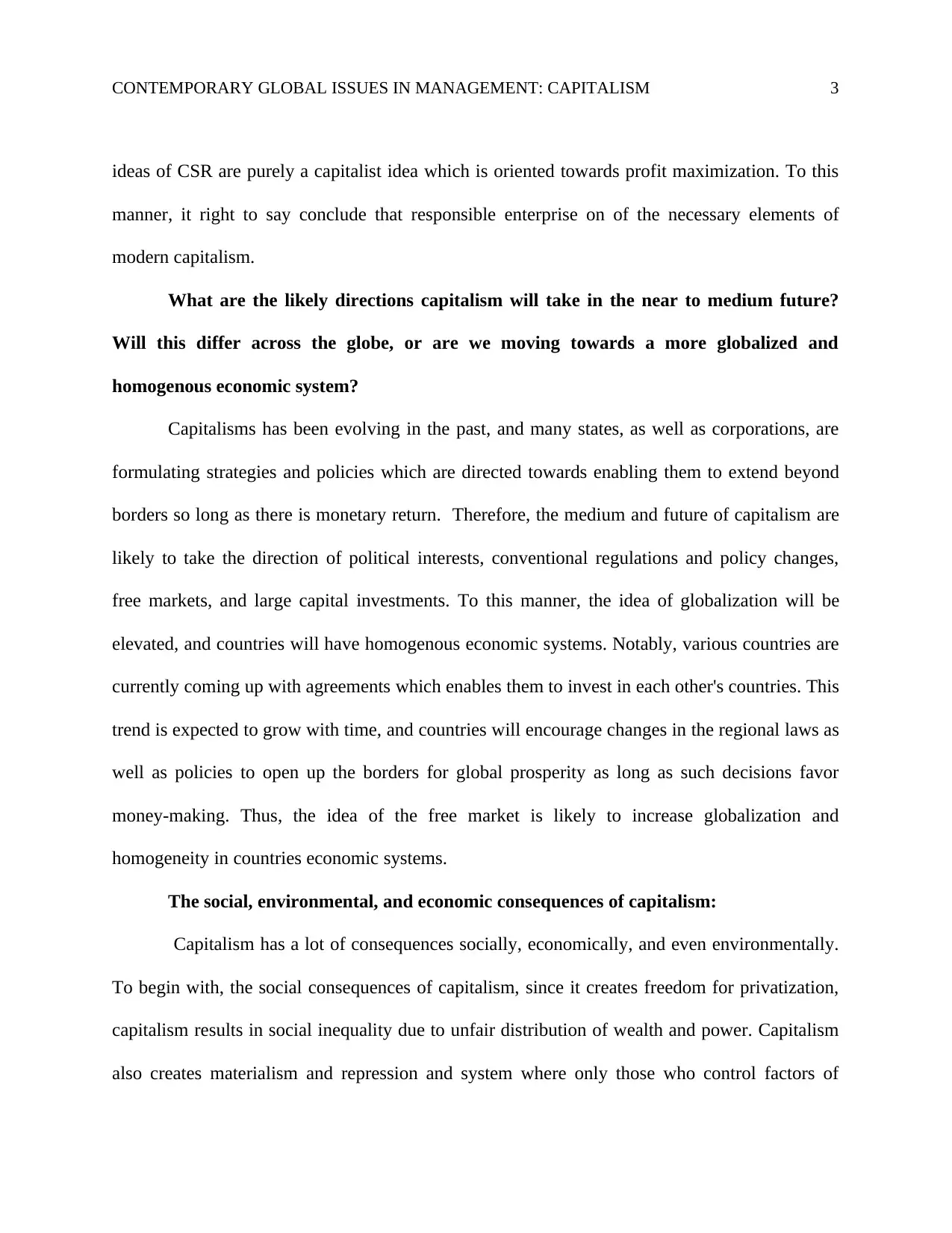
CONTEMPORARY GLOBAL ISSUES IN MANAGEMENT: CAPITALISM 3
ideas of CSR are purely a capitalist idea which is oriented towards profit maximization. To this
manner, it right to say conclude that responsible enterprise on of the necessary elements of
modern capitalism.
What are the likely directions capitalism will take in the near to medium future?
Will this differ across the globe, or are we moving towards a more globalized and
homogenous economic system?
Capitalisms has been evolving in the past, and many states, as well as corporations, are
formulating strategies and policies which are directed towards enabling them to extend beyond
borders so long as there is monetary return. Therefore, the medium and future of capitalism are
likely to take the direction of political interests, conventional regulations and policy changes,
free markets, and large capital investments. To this manner, the idea of globalization will be
elevated, and countries will have homogenous economic systems. Notably, various countries are
currently coming up with agreements which enables them to invest in each other's countries. This
trend is expected to grow with time, and countries will encourage changes in the regional laws as
well as policies to open up the borders for global prosperity as long as such decisions favor
money-making. Thus, the idea of the free market is likely to increase globalization and
homogeneity in countries economic systems.
The social, environmental, and economic consequences of capitalism:
Capitalism has a lot of consequences socially, economically, and even environmentally.
To begin with, the social consequences of capitalism, since it creates freedom for privatization,
capitalism results in social inequality due to unfair distribution of wealth and power. Capitalism
also creates materialism and repression and system where only those who control factors of
ideas of CSR are purely a capitalist idea which is oriented towards profit maximization. To this
manner, it right to say conclude that responsible enterprise on of the necessary elements of
modern capitalism.
What are the likely directions capitalism will take in the near to medium future?
Will this differ across the globe, or are we moving towards a more globalized and
homogenous economic system?
Capitalisms has been evolving in the past, and many states, as well as corporations, are
formulating strategies and policies which are directed towards enabling them to extend beyond
borders so long as there is monetary return. Therefore, the medium and future of capitalism are
likely to take the direction of political interests, conventional regulations and policy changes,
free markets, and large capital investments. To this manner, the idea of globalization will be
elevated, and countries will have homogenous economic systems. Notably, various countries are
currently coming up with agreements which enables them to invest in each other's countries. This
trend is expected to grow with time, and countries will encourage changes in the regional laws as
well as policies to open up the borders for global prosperity as long as such decisions favor
money-making. Thus, the idea of the free market is likely to increase globalization and
homogeneity in countries economic systems.
The social, environmental, and economic consequences of capitalism:
Capitalism has a lot of consequences socially, economically, and even environmentally.
To begin with, the social consequences of capitalism, since it creates freedom for privatization,
capitalism results in social inequality due to unfair distribution of wealth and power. Capitalism
also creates materialism and repression and system where only those who control factors of
⊘ This is a preview!⊘
Do you want full access?
Subscribe today to unlock all pages.

Trusted by 1+ million students worldwide
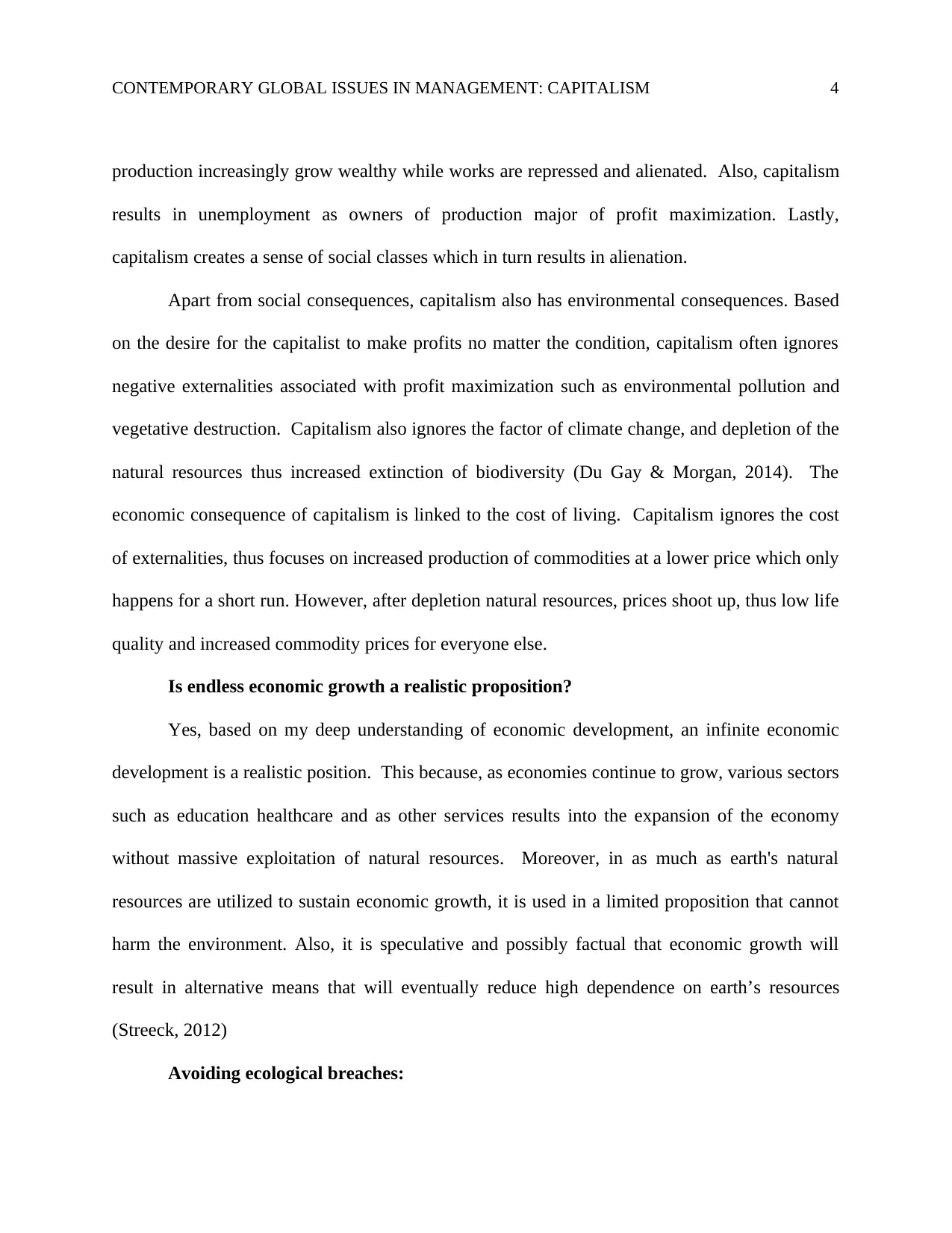
CONTEMPORARY GLOBAL ISSUES IN MANAGEMENT: CAPITALISM 4
production increasingly grow wealthy while works are repressed and alienated. Also, capitalism
results in unemployment as owners of production major of profit maximization. Lastly,
capitalism creates a sense of social classes which in turn results in alienation.
Apart from social consequences, capitalism also has environmental consequences. Based
on the desire for the capitalist to make profits no matter the condition, capitalism often ignores
negative externalities associated with profit maximization such as environmental pollution and
vegetative destruction. Capitalism also ignores the factor of climate change, and depletion of the
natural resources thus increased extinction of biodiversity (Du Gay & Morgan, 2014). The
economic consequence of capitalism is linked to the cost of living. Capitalism ignores the cost
of externalities, thus focuses on increased production of commodities at a lower price which only
happens for a short run. However, after depletion natural resources, prices shoot up, thus low life
quality and increased commodity prices for everyone else.
Is endless economic growth a realistic proposition?
Yes, based on my deep understanding of economic development, an infinite economic
development is a realistic position. This because, as economies continue to grow, various sectors
such as education healthcare and as other services results into the expansion of the economy
without massive exploitation of natural resources. Moreover, in as much as earth's natural
resources are utilized to sustain economic growth, it is used in a limited proposition that cannot
harm the environment. Also, it is speculative and possibly factual that economic growth will
result in alternative means that will eventually reduce high dependence on earth’s resources
(Streeck, 2012)
Avoiding ecological breaches:
production increasingly grow wealthy while works are repressed and alienated. Also, capitalism
results in unemployment as owners of production major of profit maximization. Lastly,
capitalism creates a sense of social classes which in turn results in alienation.
Apart from social consequences, capitalism also has environmental consequences. Based
on the desire for the capitalist to make profits no matter the condition, capitalism often ignores
negative externalities associated with profit maximization such as environmental pollution and
vegetative destruction. Capitalism also ignores the factor of climate change, and depletion of the
natural resources thus increased extinction of biodiversity (Du Gay & Morgan, 2014). The
economic consequence of capitalism is linked to the cost of living. Capitalism ignores the cost
of externalities, thus focuses on increased production of commodities at a lower price which only
happens for a short run. However, after depletion natural resources, prices shoot up, thus low life
quality and increased commodity prices for everyone else.
Is endless economic growth a realistic proposition?
Yes, based on my deep understanding of economic development, an infinite economic
development is a realistic position. This because, as economies continue to grow, various sectors
such as education healthcare and as other services results into the expansion of the economy
without massive exploitation of natural resources. Moreover, in as much as earth's natural
resources are utilized to sustain economic growth, it is used in a limited proposition that cannot
harm the environment. Also, it is speculative and possibly factual that economic growth will
result in alternative means that will eventually reduce high dependence on earth’s resources
(Streeck, 2012)
Avoiding ecological breaches:
Paraphrase This Document
Need a fresh take? Get an instant paraphrase of this document with our AI Paraphraser
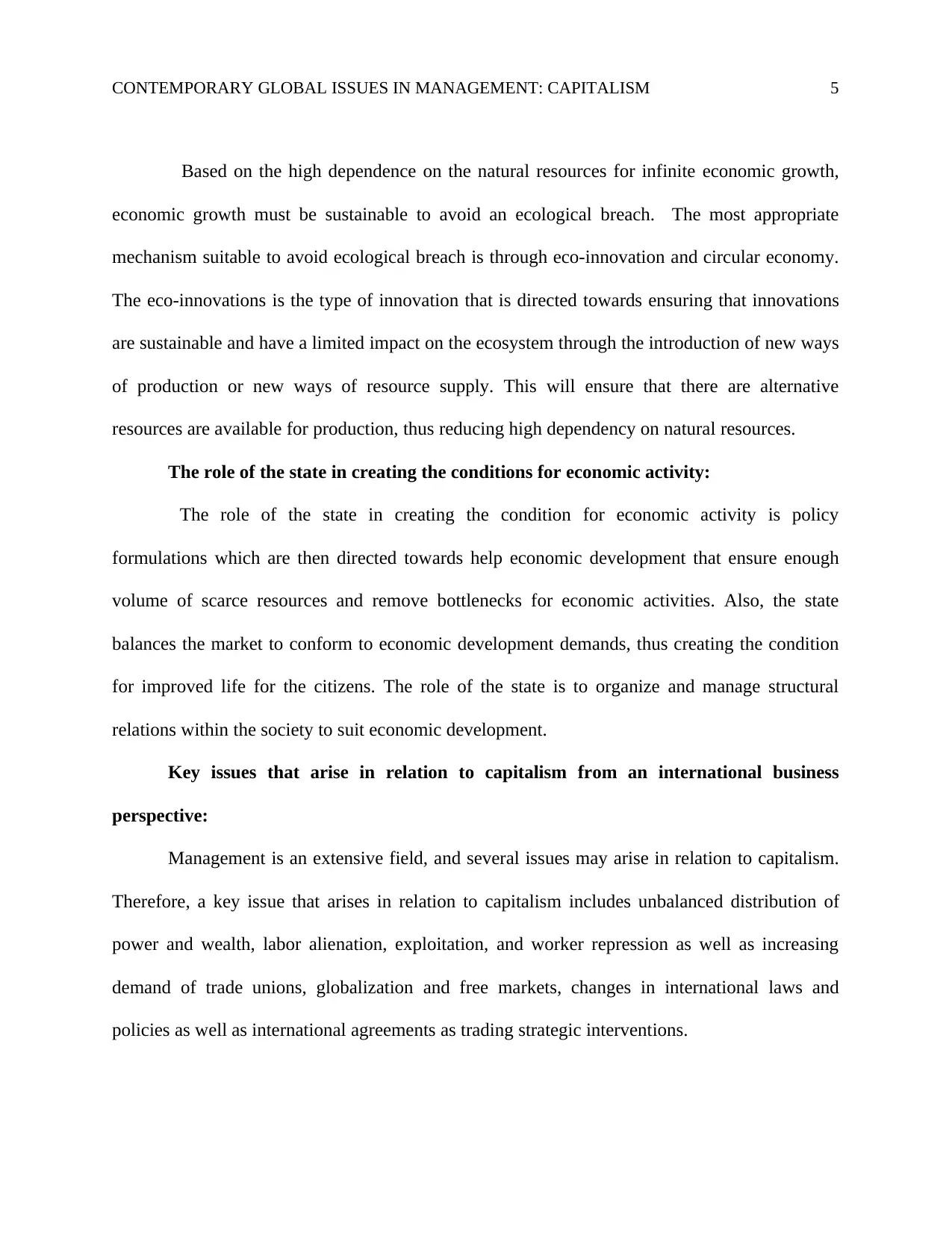
CONTEMPORARY GLOBAL ISSUES IN MANAGEMENT: CAPITALISM 5
Based on the high dependence on the natural resources for infinite economic growth,
economic growth must be sustainable to avoid an ecological breach. The most appropriate
mechanism suitable to avoid ecological breach is through eco-innovation and circular economy.
The eco-innovations is the type of innovation that is directed towards ensuring that innovations
are sustainable and have a limited impact on the ecosystem through the introduction of new ways
of production or new ways of resource supply. This will ensure that there are alternative
resources are available for production, thus reducing high dependency on natural resources.
The role of the state in creating the conditions for economic activity:
The role of the state in creating the condition for economic activity is policy
formulations which are then directed towards help economic development that ensure enough
volume of scarce resources and remove bottlenecks for economic activities. Also, the state
balances the market to conform to economic development demands, thus creating the condition
for improved life for the citizens. The role of the state is to organize and manage structural
relations within the society to suit economic development.
Key issues that arise in relation to capitalism from an international business
perspective:
Management is an extensive field, and several issues may arise in relation to capitalism.
Therefore, a key issue that arises in relation to capitalism includes unbalanced distribution of
power and wealth, labor alienation, exploitation, and worker repression as well as increasing
demand of trade unions, globalization and free markets, changes in international laws and
policies as well as international agreements as trading strategic interventions.
Based on the high dependence on the natural resources for infinite economic growth,
economic growth must be sustainable to avoid an ecological breach. The most appropriate
mechanism suitable to avoid ecological breach is through eco-innovation and circular economy.
The eco-innovations is the type of innovation that is directed towards ensuring that innovations
are sustainable and have a limited impact on the ecosystem through the introduction of new ways
of production or new ways of resource supply. This will ensure that there are alternative
resources are available for production, thus reducing high dependency on natural resources.
The role of the state in creating the conditions for economic activity:
The role of the state in creating the condition for economic activity is policy
formulations which are then directed towards help economic development that ensure enough
volume of scarce resources and remove bottlenecks for economic activities. Also, the state
balances the market to conform to economic development demands, thus creating the condition
for improved life for the citizens. The role of the state is to organize and manage structural
relations within the society to suit economic development.
Key issues that arise in relation to capitalism from an international business
perspective:
Management is an extensive field, and several issues may arise in relation to capitalism.
Therefore, a key issue that arises in relation to capitalism includes unbalanced distribution of
power and wealth, labor alienation, exploitation, and worker repression as well as increasing
demand of trade unions, globalization and free markets, changes in international laws and
policies as well as international agreements as trading strategic interventions.
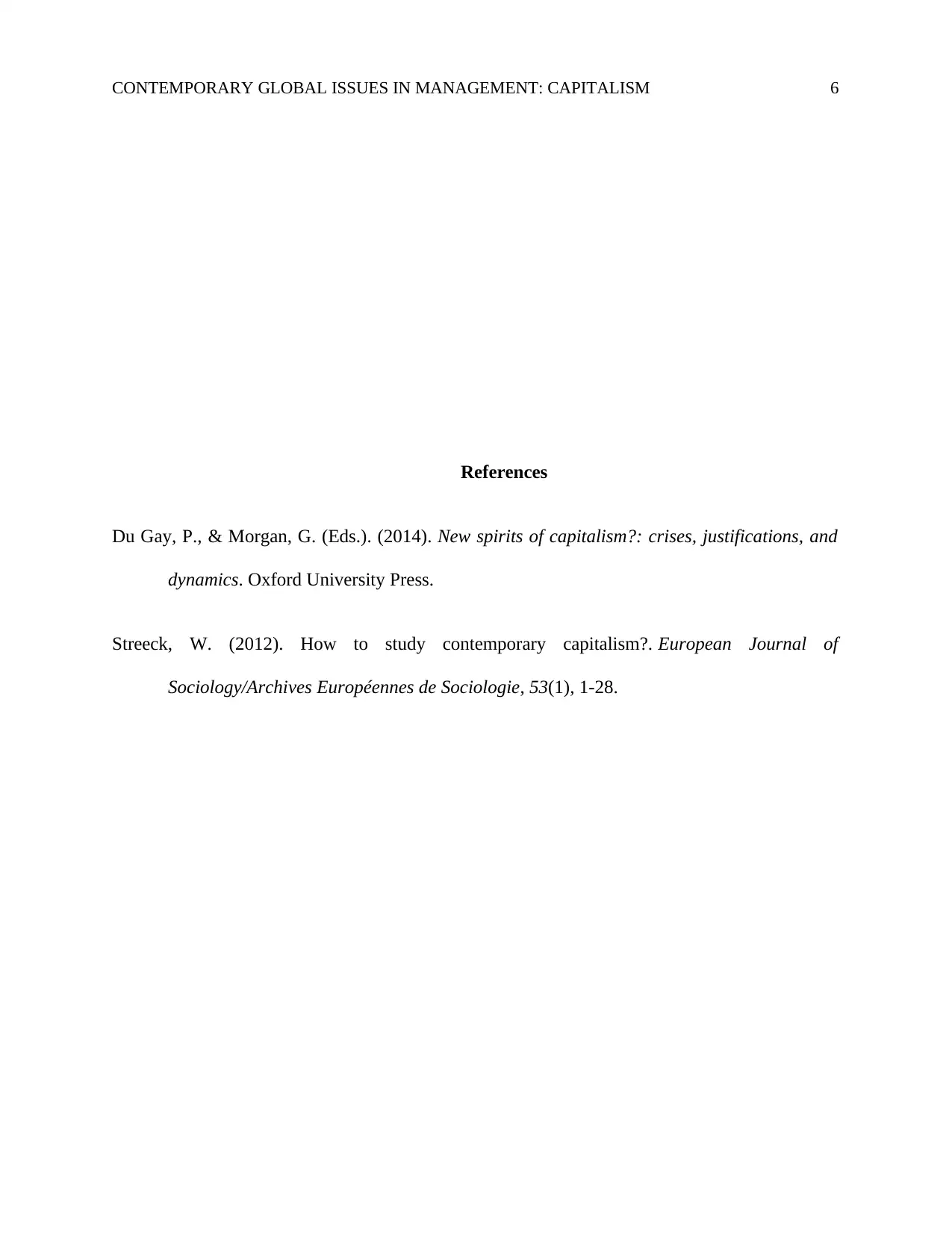
CONTEMPORARY GLOBAL ISSUES IN MANAGEMENT: CAPITALISM 6
References
Du Gay, P., & Morgan, G. (Eds.). (2014). New spirits of capitalism?: crises, justifications, and
dynamics. Oxford University Press.
Streeck, W. (2012). How to study contemporary capitalism?. European Journal of
Sociology/Archives Européennes de Sociologie, 53(1), 1-28.
References
Du Gay, P., & Morgan, G. (Eds.). (2014). New spirits of capitalism?: crises, justifications, and
dynamics. Oxford University Press.
Streeck, W. (2012). How to study contemporary capitalism?. European Journal of
Sociology/Archives Européennes de Sociologie, 53(1), 1-28.
⊘ This is a preview!⊘
Do you want full access?
Subscribe today to unlock all pages.

Trusted by 1+ million students worldwide
1 out of 6
Related Documents
Your All-in-One AI-Powered Toolkit for Academic Success.
+13062052269
info@desklib.com
Available 24*7 on WhatsApp / Email
![[object Object]](/_next/static/media/star-bottom.7253800d.svg)
Unlock your academic potential
Copyright © 2020–2026 A2Z Services. All Rights Reserved. Developed and managed by ZUCOL.





